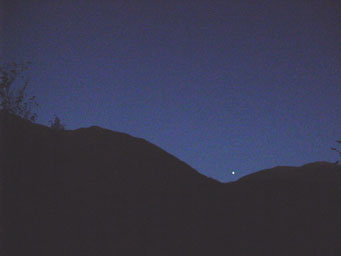I hate to keep harping on the same theme, but I had another lovely backcountry stargazing session last weekend.
The basic problem with backcountry stargazing in the U.S. Northeast — by which I mean stargazing from spots more than a short walk from a road — is trees. As I've written in another blog, trees are the single biggest obstacle to stargazing in my part of the world. In the western U.S., it's easy to find deserts, prairies, or mountain meadows. In the Northeast, by contrast, there's just a few square miles of mountaintop above treeline, and it's illegal to camp there, to prevent it from being loved to death.
At lower elevations, it's just endless trees. So it's very hard to find a legal wilderness campsite with a decent view of the sky. One of my favorites is a spot called The Bluff a few miles north of Mt. Washington, the highest mountain in the Northeast. It's on the edge of a gorge, steep enough so that you can actually see a little through the tops of the trees. And there's a lovely boulder there from whose top you have quite a decent view. The only downside is that Mount Washington blocks much of the southern sky.

Jupiter sets over Sphinx Col in New Hampshire's White Mountains.
Tony Flanders
I ended up camping there last weekend. I had intended to walk farther and camp in the woods, so I didn't bother to bring any astronomy equipment. But when I got there and remembered just what a charmed spot it is, I couldn't resist staying. Saturday morning, I woke up at 4 a.m. to watch the zodiacal light from the top of the boulder. It was a very memorable view, with the tall, rightward slanting pyramid of zodiacal light reaching up to cross the left-slanting Milky Way in the foot of Gemini, right about M35. But without my DSLR, I couldn't capture that, so you'll have to settle for the view of Jupiter setting over Sphinx Col that's shown at upper right.
Saturday evening, like the dutiful astronomer that I am, I went back up on the boulder to celebrate International Observe the Moon Night. True, I'd brought no real astronomical instruments, but I never go anywhere without my 6×15 monocular. And you know what? It's amazing how much you can see on the Moon at 6×. The wall of Sinus Iridum jutting out from the terminator was particularly lovely.
 4
4
Comments
Juliette
September 20, 2010 at 11:35 am
How similar my case is. I have my telescope on the balcony, although in Lebanon our sky is forever beautiful and so near, I have the problem of the pine trees. I try to be on the look just before both the moon and after midnight Jupiter, are not behind our pine trees.
I have another view from the terrace above, but it was fresh the last few nights. I am more comfortable down.
Thanks for your Home page, I am following your topics..
Juliette
You must be logged in to post a comment.
Juliette
September 20, 2010 at 11:43 am
I have the same problem on my balcony, I try to catch the moon and later on Jupiter, just before they are hidden by our Pine Trees. The Lebanese sky is so beautiful and clear, but I cannot go on the terrace where it will be above the trees, it was rather fresh the last few days.
The last two nights, I was very pleased observing the moon, but Jupiter not as much. I will try again for Jupiter. Thanks for your Topic, Juliette
You must be logged in to post a comment.
CarterB
September 20, 2010 at 2:50 pm
Have you considered your 2009 Hot Product Lite Scope. I've one on order and am excited by it's weight. You can get 12" for 6 pounds in a backup if you are willing to pay a premium.
You must be logged in to post a comment.
MatthewG
September 20, 2010 at 5:35 pm
I've had some of my best naked-eye viewing from a mountaintop. In January of 2009 a friend and I camped near the summit of Rocky Peak Ridge (in the Adirondacks). We had a gorgeous view of Jupiter and Venus, as well as being able to see the Andromeda galaxy without any problems.
This type of camping isn't for the faint of heart, though. That night it went down to -30 Celcius (-20 to -25 F). Good thing for mummy bags!
You must be logged in to post a comment.
You must be logged in to post a comment.